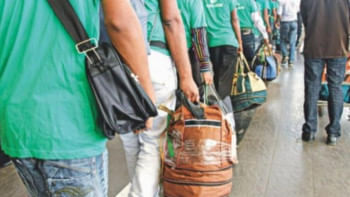Winter chills bite farming hard

Cold weather persisting for almost three weeks is harming paddy and potato farming in different districts while vegetable growers fear pest attacks amid foggy conditions will damage their produce.
At a time when prices of rice are rising and winter vegetables are staying costly, poor harvest will make food items even dearer later.
"Due to the cold and fog, the seedlings have turned yellowish, and nearly half of my seedbed for boro paddy is already damaged. If the weather stays like this for a few more days, the entire seedbed will be damaged," said Abed Ali, a farmer in Chilmari upazila of Kurigram, who has a seedbed on 20 decimals of land and plans to cultivate paddy in April and May.
Farmers preparing boro seedlings in Rajshahi, Dinajpur and Lalmonirhat expressed similar concerns.
Boro paddy, the main crop grown in the dry season, accounted for 53 percent of an estimated 3.90 crore tonnes of rice produced in the 2022-23 fiscal year, according to Bangladesh Bureau of Statistics.
In the current boro season, the agriculture ministry's target is to ensure production of 2.22 crore tonnes of rice. To reach the target, seedlings must be transplanted on 50 lakh hectares of land, officials said.
As of January 18, farmers transplanted the seedlings on 13 lakh hectares, according to the Department of Agricultural Extension (DAE).
"Due to the cold and fog, the seedlings have turned yellowish, and nearly half of my seedbed for boro paddy is already damaged. If the weather stays like this for a few more days, the entire seedbed will be damaged."
Sazzadur Rahman, chief scientific officer (plant physiology) at Bangladesh Rice Research Institute, said when temperatures below 15 degrees Celsius persist for five consecutive days, plants cannot make their own food through photosynthesis, the leaves turn yellow, and the plants become weak.
Prof Parvez Anwar, who teaches Agronomy at Bangladesh Agricultural University, said farmers who have yet to transplant boro seedlings are likely to be affected. But those who already transplanted the seedlings, and the area has not seen low temperatures will not be affected.
Since it is colder in Rangpur, Rajshahi and Sylhet divisions, farmers in those regions may be affected, he added.
"Pumping water into the seedbeds in the morning will be helpful because it will keep the plants relatively warm," he said, adding that covering the seedbeds with plastic sheets will also protect the plants.
According to Bangladesh Meteorological Department, different districts in Rangpur, Rajshahi, Dhaka and Sylhet recorded temperatures below 15 degrees Celsius on multiple days since January 3.
Farmers in several northern districts say cold weather increases the risk of blight disease in potatoes and affects mustard, onion farms.
In the 2022-23 fiscal year, winter vegetables accounted for over 63 percent of the country's total 2.25 crore tonnes of vegetable production, according to the DAE, which has a target to ensure production of 1.45 crore tonnes of vegetables this winter.
DAE's target for potato production is 1.16 crore tonnes.
Satish Chandra Barman, a farmer in Lalmonirhat, said maize plants were rotting in his farm because irrigated water has not dried due to the lack of sunlight.
He added that half of his 25-decimal boro seedbed had been damaged in recent days.
A farmer in Rajshahi's Tanore said covering the seedbeds with plastic sheets was not of much help due to lack of sunlight.
Mozdar Ali, deputy director of DAE in Rajshahi, said the late blight diseases have not affected many potato farms.
Jahangir Hossain, a former director at Tuber Crops Research Centre, said potato farms may be hit by the late blight disease if the temperature dips below 10 degrees Celsius.
Munshi Rashid Ahmad, director of Horticulture Research Centre, said small, new, and weak plants get affected by low temperatures and lack of sunlight.
DAE Director General Badal Chandra Biswas said the impact of cold on crops has not been estimated yet. However, there will be no major damage, he added.
However, the DAE's potato production target may not be met this year for different reasons, he said.
[Our correspondents from Rajshahi, Lalmonirhat and Dinajpur contributed to this report.]


 For all latest news, follow The Daily Star's Google News channel.
For all latest news, follow The Daily Star's Google News channel. 






Comments